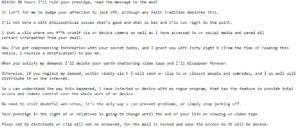Remove “Within 96 hours I’ll ruin your prestige” sextortion scam
“Within 96 hours I’ll ruin your prestige” is how a recent sextortion email starts. The email is classified a sextortion scam because it falsely claims to have a sensitive video of the email receiver and threatens to publish it if $1450 in Bitcoin is not paid.
If you receive an email that begins with “Within 96 hours I’ll ruin your prestige”, know that’s it’s merely a sextortion scam and you do not need to engage with it. If you’re interested in more details, this email is just another version of the very common sextortion scam where a scammer threatens to release a sensitive video if money is not paid. The scams all work the same way and the main idea is identical all-round, but the email contents differ, mainly because they’re sent by different scammers.
This particular sextortion scam explains that your computer is infected with a “rogue program” that has allowed its operator (the sender of this email) access to your computer. Supposedly, the scammer was able to take remote access of the device, which allowed them to film a compromising clip via the webcam. They also claim to have all your email contact information and threaten to send the video if they’re not paid. The email says that you are given 48 hours to make the payment, and they claim that they will “receive a notification” as soon as you open the email.
If it hasn’t been made clear yet, the email is complete nonsense and merely an attempt to extort money. It’s also a very low-effort scam, as scammers don’t even try to sound professional or even legitimate, judging from the very poor grammar and awkward English used in the email. There are many similar email scams, and not all of them are sextortion. There have been ones that threaten to detonate bombs, infect with COVID-19, assassinate, etc. They’re all as ridiculous as they sound, and there’s little chance that users actually take them seriously. Some of the scam emails may also contain passwords, in an attempt to make them seem more legitimate. The passwords are usually old and no longer used, and that’s because they were part of old data breaches. That doesn’t mean the sender has actually stolen your data, it merely means they bought your leaked/breached data.
There is no need to engage with the email, as it’s nothing more than a scam. You can just delete “Within 96 hours I’ll ruin your prestige” email from your inbox and be done with it. In some cases, these kinds of emails may contain attachments, which if opened could bring a malware infection onto your computer. This “Within 96 hours I’ll ruin your prestige” email scam does have an attachment that displays the Bitcoin address and the sum that is requested, but it’s not malicious. Nonetheless, do not open the attachments in these kinds of scam emails.
How did scammers get hold of your email address?
If you have received a “Within 96 hours I’ll ruin your prestige” or any other kind of sextortion email, your email address was likely leaked by some service you use or it was part of data breach. Whatever the case may be, your email address was purchased from a hacker forum by scammers, so you can expect to receive a lot of spam on a regular basis. Fortunately, it usually lands in the spam folder where you won’t notice them if you don’t check it.
In some cases, the sextortion emails may also contain users’ actual passwords and phone numbers. These are used to make the scam emails appear more legitimate, as it gives the impression that the sender actually has access to the computer. However, the passwords are usually old ones that users no longer use. Both passwords and phone numbers are obtained the same way as email addresses. The information is leaked or stolen during a data breach as well. If you ever receive a spam email and it contains a password you currently use, you need to change it immediately. You should also never reuse passwords.
“Within 96 hours I’ll ruin your prestige” email removal
All you need to do is remove “Within 96 hours I’ll ruin your prestige” sextortion email from your inbox. The email has an attachment, which we do not recommend opening. If you have opened it, as a precaution, we recommend scanning your computer with anti-virus software, as the attachment could have contained malware.
Site Disclaimer
WiperSoft.com is not sponsored, affiliated, linked to or owned by malware developers or distributors that are referred to in this article. The article does NOT endorse or promote malicious programs. The intention behind it is to present useful information that will help users to detect and eliminate malware from their computer by using WiperSoft and/or the manual removal guide.
The article should only be used for educational purposes. If you follow the instructions provided in the article, you agree to be bound by this disclaimer. We do not guarantee that the article will aid you in completely removing the malware from your PC. Malicious programs are constantly developing, which is why it is not always easy or possible to clean the computer by using only the manual removal guide.

